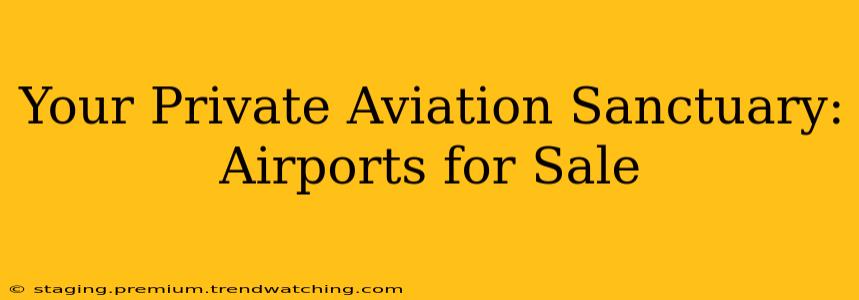Owning a private airport? It sounds like a fantasy straight out of a tycoon movie, but for some, it's a reality. The allure of complete control over your aviation experience, coupled with a significant investment opportunity, makes purchasing a private airport an increasingly attractive proposition. This comprehensive guide explores the world of airports for sale, examining the factors to consider, the potential benefits, and the realities of owning such a unique asset.
Why Buy a Private Airport?
The reasons for acquiring a private airport are as diverse as the buyers themselves. Some seek a strategic investment, others a personal aviation haven, and still others a blend of both. The advantages, however, often revolve around these key themes:
-
Unparalleled Convenience: Imagine taking off and landing whenever you wish, without the hassles of commercial airport schedules and security lines. This is the core benefit—complete control over your travel itinerary.
-
Enhanced Privacy and Security: Private airports offer a significantly higher level of privacy and security compared to public airports. Your movements are less visible, and the security protocols can be tailored to your specific needs.
-
Investment Potential: A well-managed private airport can be a lucrative investment, generating revenue through aircraft storage, maintenance services, fueling, and flight training. The value of the land itself also appreciates over time.
-
Unique Lifestyle: Owning a private airport is a statement of exclusivity and independence. It’s a testament to success and a gateway to a unique lifestyle centered around aviation.
What are the Different Types of Airports for Sale?
The market for airports for sale encompasses a broad range of sizes and functionalities. You might find:
-
Small, Private Airfields: These are typically smaller airstrips catering to light aircraft. They often require less investment and maintenance but might have limited revenue-generating potential.
-
Larger, Multi-Use Airports: These airports can accommodate a wider variety of aircraft, potentially including jets and larger turboprops. They often offer greater investment potential but require significantly more capital and expertise to manage.
-
Runways with attached properties: Some airports for sale will include surrounding land that can be used for various purposes, from building hangars to developing additional revenue streams.
What Factors Should I Consider Before Buying an Airport?
Purchasing a private airport is a significant undertaking, demanding careful consideration of various aspects:
-
Financial Viability: Conduct a thorough financial analysis, including evaluating the potential revenue streams, operating costs, and maintenance requirements. Consult with financial advisors specializing in aviation investments.
-
Legal and Regulatory Compliance: Navigating the regulatory landscape of airport ownership is crucial. Work with aviation lawyers and consultants experienced in this field. Understanding FAA regulations and local zoning laws is paramount.
-
Infrastructure Assessment: A comprehensive assessment of the airport's existing infrastructure is essential. This includes the runway, taxiways, lighting systems, hangars, and fueling facilities. Any necessary upgrades or repairs will significantly impact your investment.
-
Market Analysis: Research the local aviation market to understand the demand for airport services in the region. Factors like population density, business activity, and the presence of other airports will influence your potential revenue.
How much does it cost to buy an airport?
The cost of buying an airport varies significantly depending on its size, location, and infrastructure. Prices range from hundreds of thousands of dollars for smaller, more basic airstrips to tens of millions of dollars for larger, more developed airports.
What licenses and permits are needed to operate a private airport?
The licenses and permits required to operate a private airport vary depending on the location and the scale of operations. However, you'll generally need FAA approval and adherence to local zoning regulations. You'll also need to ensure compliance with environmental regulations.
What are the ongoing costs of owning and operating a private airport?
Ongoing costs include runway maintenance, lighting system upkeep, hangar repairs, insurance, and staff salaries. Fueling facilities also incur significant costs, and potential liability associated with operating the airport needs to be accounted for.
How can I find airports for sale?
Several avenues exist for finding airports for sale, including working with specialized aviation brokers, searching online real estate listings focused on commercial properties, and connecting with industry networks.
Owning a private airport represents a unique investment and lifestyle opportunity. However, careful planning, thorough due diligence, and expert advice are critical for success. By understanding the complexities and potential rewards, you can embark on this extraordinary journey with confidence.

